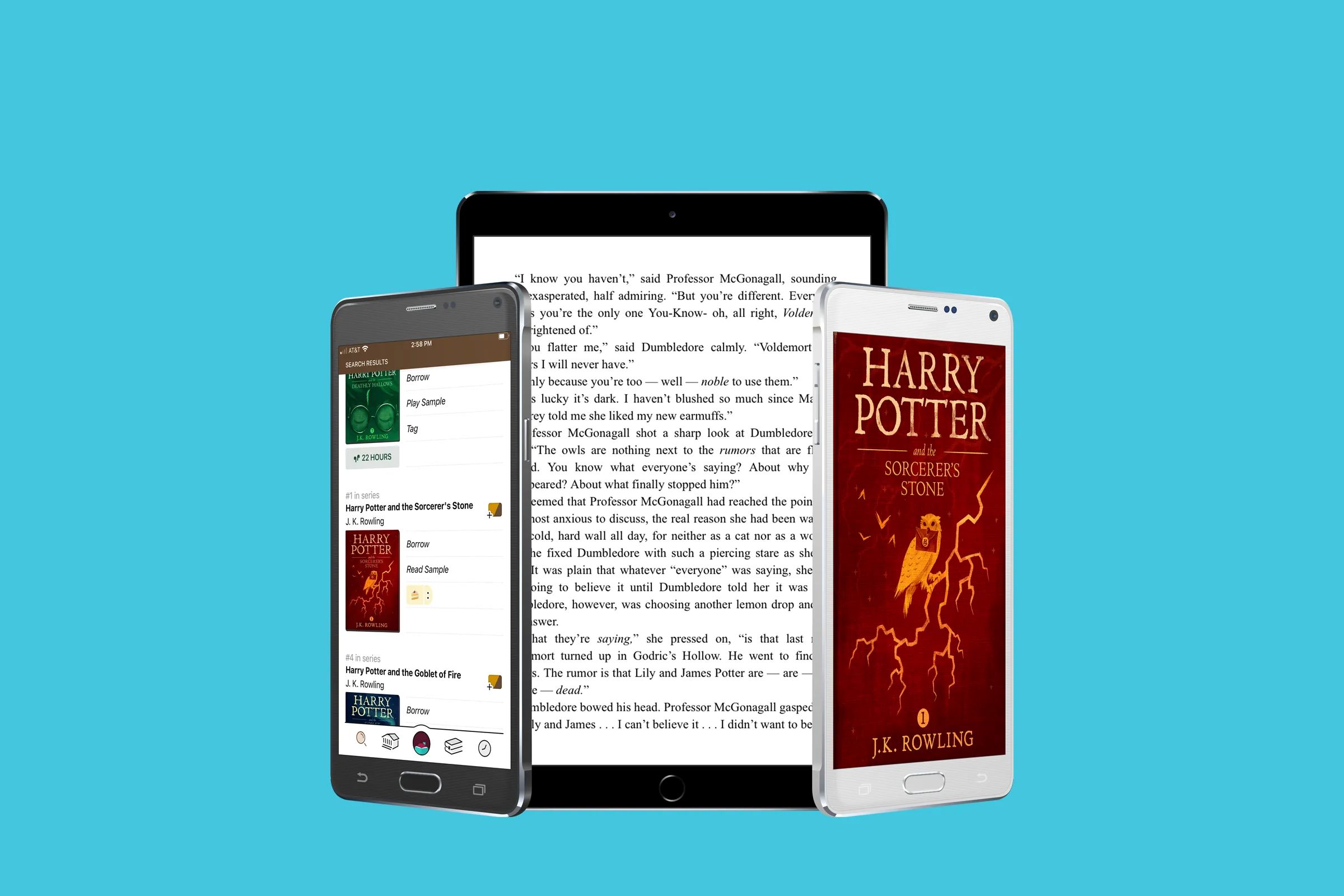Home>Production & Technology>Audiobook>What Is The Difference Between An Ebook And Audiobook


Audiobook
What Is The Difference Between An Ebook And Audiobook
Modified: January 22, 2024
"Discover the key distinctions between ebooks and audiobooks. Uncover the benefits of choosing an audiobook format for a more immersive and convenient reading experience."
(Many of the links in this article redirect to a specific reviewed product. Your purchase of these products through affiliate links helps to generate commission for AudioLover.com, at no extra cost. Learn more)
Table of Contents
Introduction
In today’s digital age, reading books doesn’t necessarily mean flipping through printed pages. With the advancement of technology, two popular forms of books have emerged: ebooks and audiobooks. While both provide access to literature in a convenient manner, they differ in various aspects, catering to different preferences and needs. Understanding the difference between ebooks and audiobooks can help readers navigate the diverse world of literature and choose the format that best suits their lifestyle and preferences.
Ebooks, also known as electronic books, are digital versions of traditional printed books. They can be accessed and read on electronic devices such as e-readers, tablets, smartphones, or computers. Unlike physical copies, ebooks are stored in digital files, allowing readers to carry an entire library in the palm of their hand. This format offers the convenience of instant access, as ebooks can be downloaded or purchased online with just a few clicks.
Audiobooks, on the other hand, offer a unique reading experience by delivering literature through spoken words. Rather than reading the text, listeners can enjoy the book through audio narration. Audiobooks are available in a downloadable format or through streaming platforms, and they can be listened to on various devices, including smartphones, tablets, computers, or dedicated audiobook devices.
Both ebooks and audiobooks have their own advantages and appeal to different audiences. In this article, we will delve deeper into the differences between these two formats, exploring factors such as format and medium, reading/listening experience, accessibility, cost, and portability. By understanding these distinctions, readers can make informed choices and immerse themselves in the wonderful world of literature.
Definition of Ebooks
Ebooks, also known as electronic books, are the digital counterparts of traditional printed books. They are designed to be read on electronic devices such as e-readers, tablets, smartphones, or computers. Unlike physical books, ebooks are stored in digital files, typically in the formats such as PDF, EPUB, or MOBI.
One of the defining features of ebooks is their accessibility. They can be downloaded or purchased online, allowing readers to instantly access a wide range of titles. With just a few clicks, readers can have an entire library at their fingertips, eliminating the need for physical storage space. This convenience is especially beneficial for avid readers who enjoy exploring various genres or authors.
Ebooks offer a customizable reading experience. Readers can adjust the font size, style, and background color to optimize their reading experience. Many e-reader devices also come with built-in features like dictionary look-up, note-taking, and highlighting, adding a layer of interactivity to enhance the reading process.
Moreover, ebooks often provide additional features that go beyond the traditional reading experience. Some ebooks include multimedia elements such as images, videos, or hyperlinks, enriching the content and allowing readers to explore related resources with ease. This interactive aspect can be particularly helpful for educational or informational books.
As for the availability of ebooks, they can be found on various platforms, including online bookstores, libraries, or even through author websites. Readers can choose to purchase ebooks individually or opt for subscription-based services that offer access to a vast library of titles.
Overall, ebooks have revolutionized the way we read and access literature. They provide a convenient, customizable, and interactive reading experience, making books more accessible to a wider audience.
Definition of Audiobooks
Audiobooks, as the name suggests, are books that are narrated and recorded in audio format. Instead of reading the text, listeners can enjoy the book through spoken words. Audiobooks are available in a downloadable format or through streaming platforms, and they can be listened to on various devices, including smartphones, tablets, computers, or dedicated audiobook devices.
One of the notable advantages of audiobooks is the immersive experience they offer. The narration brings the story to life, allowing listeners to engage with the characters and plots in a unique way. The narrators’ voices, tone, and inflection add depth and emotion to the storytelling, enhancing the overall experience.
Audiobooks cater to individuals who prefer to multitask or have limited time for traditional reading. Listeners can enjoy books while driving, exercising, doing household chores, or even during travel. Audiobooks provide the flexibility to continue enjoying literature while engaging in other activities, making them a popular choice for people with busy lifestyles.
Another advantage of audiobooks is accessibility. They are particularly beneficial for people with visual impairments or reading difficulties. The audio format enables these individuals to access literature in a more inclusive and equal manner. Additionally, audiobooks can be a great educational tool for language learners, as they allow listeners to improve their language skills through exposure to spoken words.
Similar to ebooks, audiobooks offer a wide range of titles across various genres. Popular fiction, non-fiction, self-help, and educational books are all available in audio format. Many audiobook platforms also provide professional narration, with talented voice actors bringing the books to life.
Listeners can find audiobooks on various platforms, such as online bookstores, libraries, or dedicated audiobook apps. Some platforms offer subscription services that provide unlimited access to audiobooks for a flat fee, while others allow individual purchases or rentals.
Overall, audiobooks provide a unique and immersive reading experience through the power of storytelling and spoken words. They offer flexibility, accessibility, and convenience, making literature enjoyable in a whole new way.
Format and Medium
Ebooks and audiobooks differ in terms of their format and medium, catering to distinct preferences and providing unique reading experiences.
Ebooks are digital files that can be accessed and read on electronic devices such as e-readers, tablets, smartphones, or computers. They are typically available in formats such as PDF, EPUB, or MOBI. These formats provide flexibility and compatibility with various devices and e-reader software. With ebooks, readers have the ability to adjust font sizes, styles, and background colors to suit their preferences. They can also use interactive features like dictionary look-up, note-taking, and highlighting to enhance the reading experience. Ebooks are often purchased or downloaded online, making them easily accessible and convenient to carry around.
Audiobooks, on the other hand, are delivered in an audio format. They can be listened to on devices such as smartphones, tablets, computers, or dedicated audiobook devices. Audiobooks are typically available in downloadable formats or through streaming services. The audio narration provides an immersive experience, with professional voice actors bringing the books to life through their expressive performances. Audiobooks offer the convenience of being able to listen to literature on the go, allowing for multitasking or engaging in other activities while enjoying a book.
The medium of ebooks is primarily visual. They rely on text, images, and sometimes multimedia elements to convey the content. Readers engage with ebooks through reading and visually interpreting the text on digital screens.
In contrast, audiobooks are an auditory medium. Listeners engage with the book through hearing the narrated story and voice actor performances. Audiobooks appeal to those who enjoy the storytelling aspect and find the listening experience more captivating and immersive than reading the text.
It’s important to note that some publishers offer “enhanced” ebooks that combine elements of both formats. These enhanced ebooks may include embedded audio clips, videos, or interactive elements to add a multimedia dimension to the reading experience. However, pure audiobooks remain distinct in their audio-focused format.
Both formats have their merits and appeal to different readers. Ebooks provide visual customization, interactive features, and convenience, while audiobooks offer an immersive storytelling experience through audio narration.
Reading Experience
The reading experience with ebooks and audiobooks varies significantly due to the differences in format and medium. The choice between the two formats can greatly impact the way readers engage with and experience the content.
Ebooks offer a traditional reading experience, albeit in a digital format. With ebooks, readers have full control over the pace of their reading. They can choose to skim through sections, re-read passages, or take their time to digest the content. Ebooks allow for individual interpretation and imagination, as readers can visualize the characters and settings based on the author’s descriptions. Ebooks also provide the ability to interact with the text, such as highlighting important passages, making notes, or using built-in dictionaries for word definitions. This level of interactivity and customization enhances the engagement and comprehension of the material.
On the other hand, audiobooks offer a unique listening experience. The narration, performed by professional voice actors, brings the story to life through their expressive performances. The tone, inflection, and pacing of the narration contribute to the immersive nature of audiobooks. Listening to audiobooks allows readers to absorb the content through spoken words, adding an emotional and dynamic element to the storytelling. The voice actor performances can enhance the characterization, setting, and ambiance of the story, creating a more vivid and engaging experience for listeners.
Both formats have their advantages and appeal to different reading preferences. Ebooks provide a tangible reading experience, allowing readers to actively interact with the text, control their pace, and personalize their reading settings. They are particularly well-suited for individuals who enjoy visual interpretation and have a preference for highlighting and note-taking.
Audiobooks, in contrast, provide a more passive and immersive reading experience. They are ideal for individuals who prefer to listen to stories rather than read them, or for those who want to enjoy books while engaging in other activities such as driving, exercising, or relaxing. Audiobooks allow for a hands-free and multitasking approach to literature consumption, making them a popular choice for busy readers.
Ultimately, the reading experience with ebooks and audiobooks comes down to personal preference. Some readers may find the tactile experience of reading ebooks more enjoyable, while others may prefer the immersive and emotive nature of audiobooks.
Listening Experience
The listening experience with audiobooks offers a distinct and immersive way to enjoy literature. Unlike ebooks, which rely on visual interpretation, audiobooks bring stories to life through spoken words and voice actor performances.
One of the key components that contribute to the listening experience is the narration. Audiobooks are narrated by professional voice actors who bring characters, dialogue, and narrative descriptions to life. These talented narrators use their voices, accents, and intonations to create unique personalities for each character, making the storytelling more engaging and authentic. The narration adds depth, emotion, and impact to the story that can sometimes go beyond what words on a page can convey.
The listening experience also allows for a more immersive journey into the story. Audiobooks transport listeners into the world of the book, creating a rich and vivid atmosphere. The ability to hear the rhythm of the language, the nuances of the dialogue, and the subtle details of the narrative helps listeners connect with the story on a deeper level.
Audiobooks provide an added layer of interpretation to the text. By listening to the narration, listeners can gain a better understanding of the author’s intended tone, inflection, and emphasis. This can enhance the overall comprehension of the material and provide a unique perspective on the story.
In terms of accessibility, audiobooks are particularly beneficial for individuals with visual impairments or reading difficulties. The audio format allows these individuals to access literature in a more inclusive and equal manner. Moreover, listening to audiobooks can be a helpful tool for language learners, as it provides exposure to native speakers and helps improve pronunciation, rhythm, and fluency.
The convenience of the listening experience is another advantage of audiobooks. They offer a hands-free and multitasking approach to reading, allowing listeners to enjoy books while engaging in other activities such as commuting, exercising, or doing household chores. Audiobooks enable readers to make the most of their time and incorporate literature into their daily routines in a seamless and flexible way.
Overall, the listening experience with audiobooks provides a unique and immersive way to consume literature. The narration, atmosphere, and accessibility of audiobooks contribute to a captivating and engaging journey into the world of storytelling.
Accessibility
Accessibility is an important factor to consider when comparing ebooks and audiobooks. Both formats offer unique advantages in terms of accessibility, catering to different needs and preferences.
Ebooks, being digital files, provide a high level of accessibility. They can be easily accessed and downloaded from various online platforms, making them available to readers around the world. With just an internet connection and a compatible device, readers can instantly access a wide range of titles. Ebooks also offer features that cater to individuals with specific needs, such as adjustable font sizes, text-to-speech functionality, and screen reader compatibility. These features can greatly enhance accessibility for individuals with visual impairments, reading difficulties, or other disabilities.
Audiobooks, on the other hand, appeal to individuals who prefer or require an auditory medium for accessing literature. Audiobooks provide an inclusive and equal opportunity for individuals with visual impairments to access and enjoy books. The audio format eliminates the need for reading and allows individuals to engage with literature through listening. Audiobooks often feature professional voice actors who deliver the narration with expressive performances, making the experience engaging and immersive. The ability to listen to audiobooks also benefits those with busy lifestyles or limited time for traditional reading. Listeners can enjoy books while on the go, during commutes, or while engaging in other activities like exercising or cooking.
It’s worth noting that accessibility can also be influenced by the availability and affordability of ebooks and audiobooks. Ebooks are typically more abundant and easily accessible due to the multitude of platforms, online bookstores, and libraries that offer them. They can be purchased, rented, or even borrowed for free from libraries in digital formats. Audiobooks, on the other hand, may be available through dedicated audiobook platforms, online stores, or subscription services. While audiobooks offer a unique and engaging listening experience, they may have a limited selection compared to ebooks.
Ultimately, the accessibility of ebooks and audiobooks depends on individual needs, preferences, and circumstances. Ebooks provide extensive accessibility features for different reading needs and are widely available in digital formats. Audiobooks cater to individuals who prefer auditory or multi-tasking experiences and offer inclusive access for those with visual impairments.
Cost
When it comes to comparing the cost of ebooks and audiobooks, several factors need to be considered, including the pricing models, availability, and the platform or service through which they are accessed.
Ebooks often offer a wide range of pricing options. Many ebooks are available for purchase individually, with prices varying depending on the title, popularity, and publishing rights. Some ebooks may also be available for rent or borrow from libraries, allowing readers to access them for a limited period of time without any additional cost. Additionally, there are subscription-based services that offer access to a vast library of ebooks for a flat monthly fee. These services can be a cost-effective option for voracious readers who enjoy exploring a variety of titles without purchasing them individually.
Audiobooks typically have a separate pricing structure. They may be priced higher than ebooks due to factors such as production costs, professional narration, and licensing fees. Audiobooks are often sold individually, with prices varying depending on the length of the book, the popularity of the narrator, and the demand for the title. Similar to ebooks, some audiobooks can be rented or borrowed from libraries. Additionally, there are also subscription-based audiobook services that offer unlimited access to a collection of audiobooks for a monthly fee.
It’s important to consider the availability of ebooks and audiobooks on various platforms. While ebooks are widely available on multiple online bookstores, libraries, and author websites, the availability of audiobooks may be more limited. However, the popularity of audiobooks has been on the rise, leading to a growing selection and availability across different platforms and services.
It’s worth noting that the cost-effectiveness of ebooks and audiobooks depends on individual reading habits and preferences. For readers who consume a significant number of books, subscription-based services for ebooks or audiobooks may prove to be more cost-effective in the long run. On the other hand, occasional readers may prefer to purchase ebooks or audiobooks individually, based on their specific interests or recommendations.
Ultimately, the cost of ebooks and audiobooks can vary depending on the title, availability, platform, and preferred pricing model. It is important for readers to consider their reading habits, budget, and the value they place on the convenience and accessibility of these digital formats.
Portability
Portability is a significant advantage of both ebooks and audiobooks, as they allow readers to carry a vast library of books with them in a compact and convenient manner.
Ebooks offer unparalleled portability due to their digital nature. With just a single device such as an e-reader, tablet, or smartphone, readers can store and access thousands of books. This eliminates the need to carry physical books, which can be bulky and cumbersome. Ebooks can be easily downloaded or synced across multiple devices, allowing readers to seamlessly switch between devices and pick up where they left off. This flexibility offers on-the-go convenience, making it possible to enjoy literature in various settings such as on a commute, during travel, or while waiting in line.
Audiobooks also excel in terms of portability. With the rise of smartphone usage, it has become effortless to carry an entire audiobook library in the palm of your hand. Audiobooks can be downloaded or streamed directly to a smartphone, eliminating the need for dedicated audiobook devices. This makes it convenient for listeners to enjoy books anytime, anywhere. The compact size and lightweight nature of smartphones or portable music players provide the flexibility to listen to audiobooks during activities like exercising, traveling, or relaxing. Audiobooks also offer the advantage of being able to continue listening seamlessly across different devices, ensuring a consistent experience.
Both ebooks and audiobooks offer the additional benefit of saving physical space. Instead of having shelves filled with books, readers can store an extensive collection in the digital realm, freeing up physical space in their homes or travel bags.
While both formats offer excellent portability, it’s important to consider individual reading preferences. Some readers may prefer the convenience and versatility of ebooks, with the ability to customize the reading experience and easily access a library of titles. Others may find audiobooks more portable, as they provide a hands-free and multitasking approach to literature consumption.
In summary, both ebooks and audiobooks provide unmatched portability, allowing readers to carry their favorite books wherever they go. The digital nature of these formats offers flexibility, space-saving benefits, and the freedom to enjoy literature in various settings and activities.
Conclusion
When it comes to choosing between ebooks and audiobooks, it’s important to consider personal preferences, reading habits, and the unique features that each format offers. While both formats provide convenient access to literature, they differ in terms of the reading experience, format and medium, accessibility, cost, and portability.
Ebooks offer a traditional reading experience with the added benefits of customization, interactivity, and visual engagement. They are well-suited for individuals who enjoy the flexibility of adjusting font sizes, taking notes, and highlighting important passages. Ebooks provide a tangible reading experience and offer extensive accessibility features for different reading needs.
Audiobooks, on the other hand, provide a unique and immersive listening experience. The narration, performed by professional voice actors, brings the story to life with emotion and character. Audiobooks appeal to those who prefer an auditory medium and enjoy the convenience of listening while multitasking. They offer inclusivity for individuals with visual impairments and cater to busy readers who have limited time for traditional reading.
In terms of accessibility, ebooks provide instant access to a wide range of titles through online platforms, while audiobooks provide an inclusive opportunity for individuals with visual impairments to enjoy literature through the auditory medium.
When considering cost, ebooks often offer various pricing options, including individual purchases, rentals, or subscription-based services. Audiobooks, due to factors like production costs and professional narration, may be priced higher but offer a unique listening experience. The cost-effectiveness will depend on individual reading habits and preferences.
In the aspect of portability, both ebooks and audiobooks excel. Ebooks allow for a vast library to be carried on a single device, eliminating the need for physical storage. Audiobooks offer the convenience of listening on the go and can be easily accessed through smartphones or portable music players.
In the end, the choice between ebooks and audiobooks boils down to personal preference, lifestyle, and reading habits. Some may prefer the visual engagement and interactivity of ebooks, while others may find solace and immersion in the auditory experience of audiobooks. Ultimately, both formats provide distinct avenues for readers to enjoy literature and expand their literary horizons.











